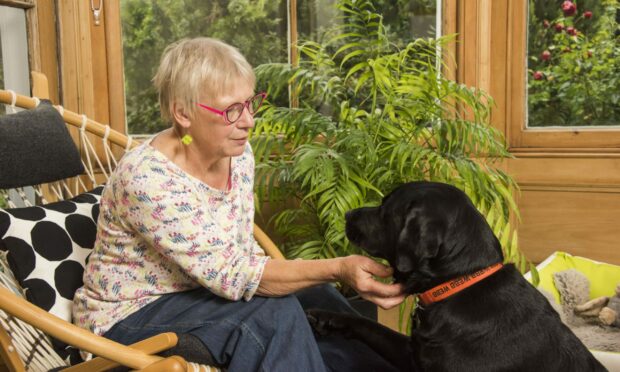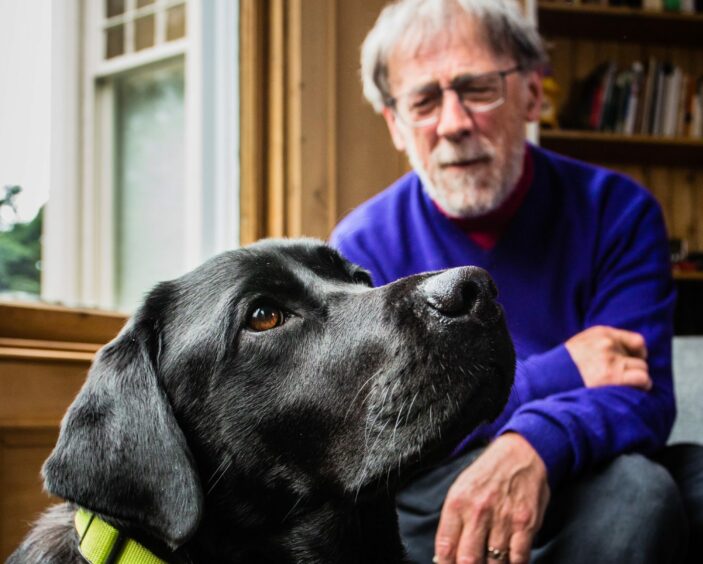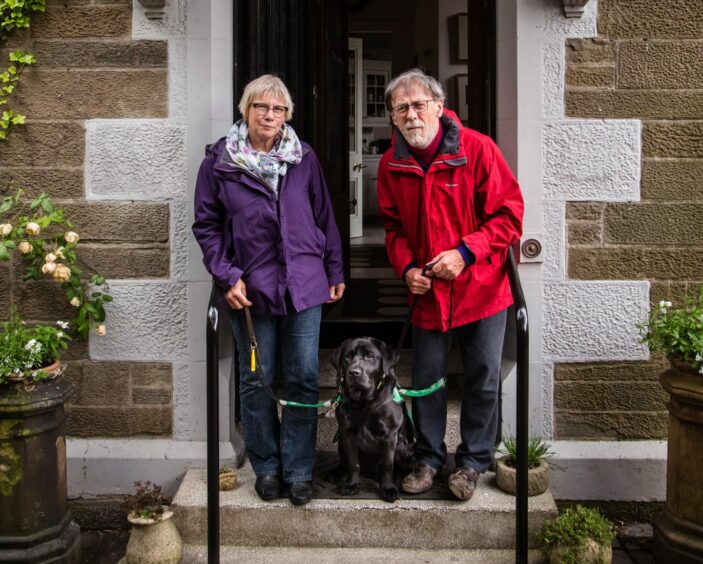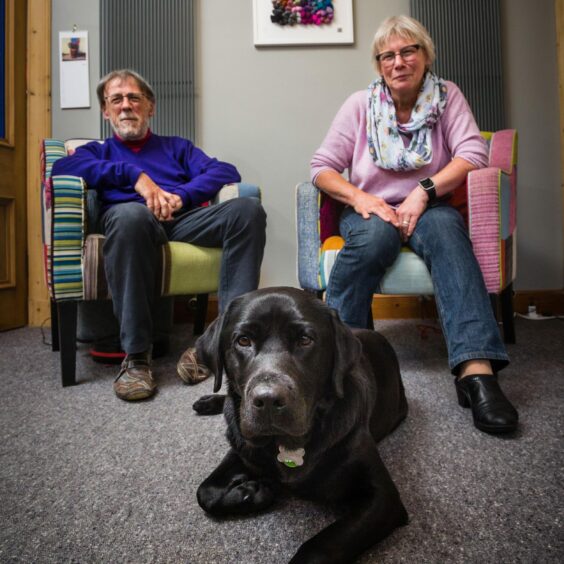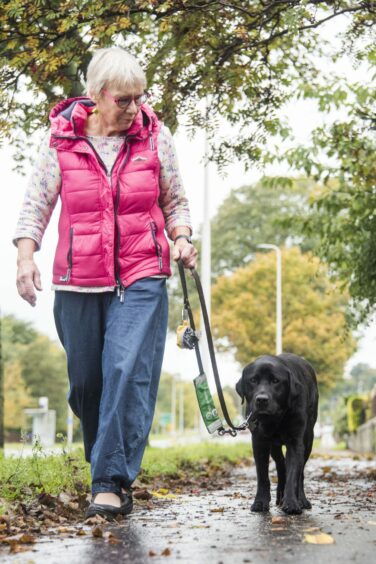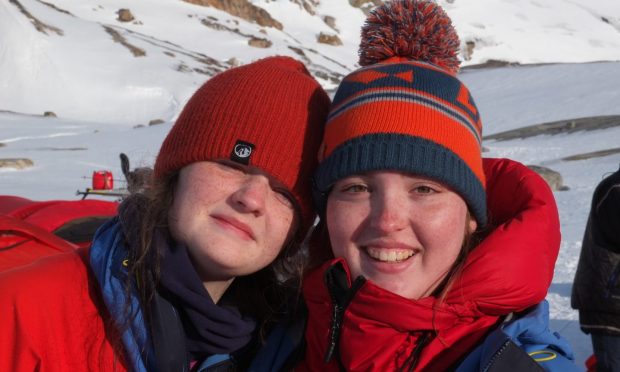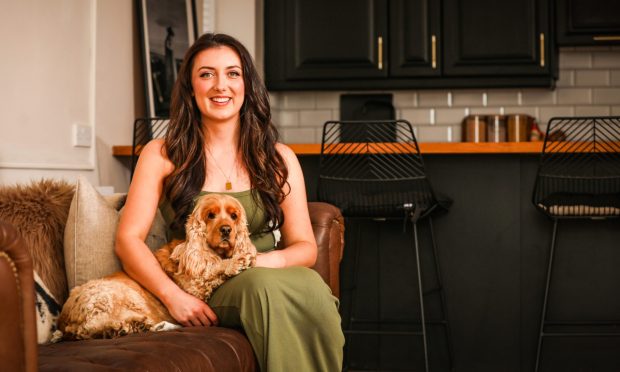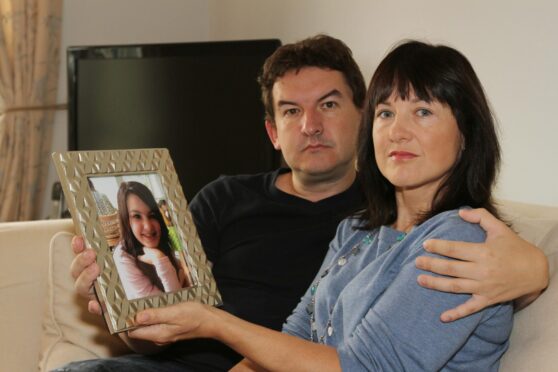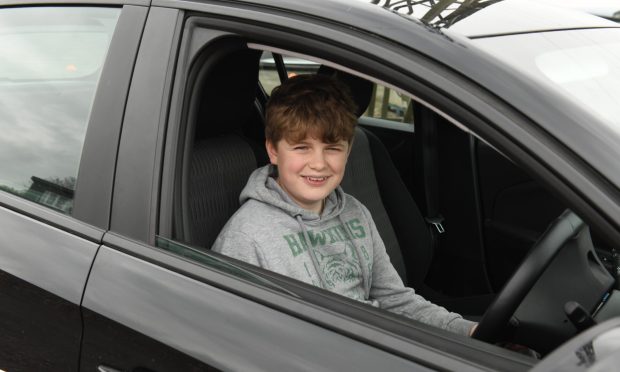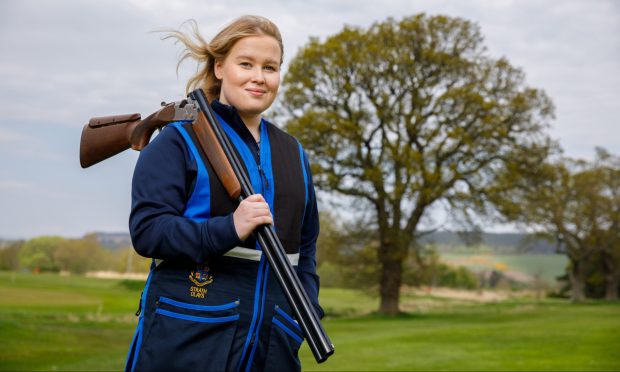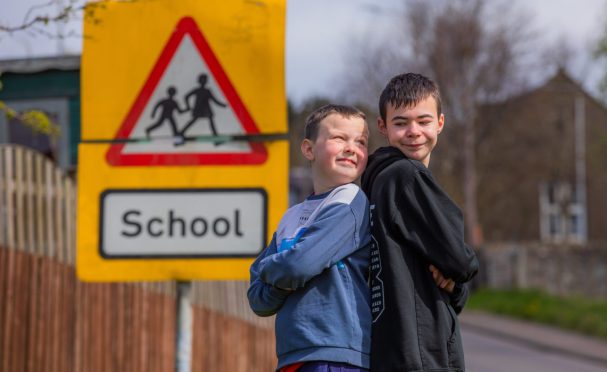Dementia can be a debilitating and isolating condition, but the support of a dementia assistance dog can transform home-life for sufferers. We spoke to one owner about her experience.
“When we were out walking I used to hear people say to their kids, ‘he’s a guide dog’,” says 68-year-old Imke Thomson.
“And I would say to them, ‘Oh no he’s much more special than that – he’s a dementia assistance dog’.”
It was a role in which black Labrador, Webb, excelled – providing a vital lifeline for Imke’s late husband Malcolm, who had dementia and Parkinson’s disease.
Webb – one of only 11 dogs ever to be placed as dementia assistance dogs by Alzheimer Scotland – would fetch and deliver Malcolm’s medication into his hand three times a day, at the sound of an alarm.
At their home on Broughty Ferry Road, Dundee, Webb would collect Malcolm’s yoga mat, roll it out and patiently sit on it until Malcolm committed to his daily exercise.
Webb helped Malcolm, then in his early 70s, to get undressed, pulling off his socks and putting them into the laundry basket.
In the later stages of Malcolm’s illness he could become extremely confused and unable to find the way out of a room.
He would ask Webb to “open the door” and the Lab would guide Malcolm out.
Imke said: “They had a very close relationship. When Malcolm sat down you would see his hand go down to check he was there and pat him on the head.
“He was quite sceptical at first and said, ‘I don’t want to be told what to do by a dog’ – the dogs we had before were always my dogs, but this was his dog.
“I had to take a step back and after a few weeks he changed his mind. It was lovely to see that bond develop.”
Diagnosis
Malcolm, originally from St Andrews, was a well established photographer in Dundee, with his own business called Studio M, on Blackness Road.
At the age of 62 he was diagnosed with Parkinson’s disease and six years later he was also diagnosed with dementia.
Malcolm lived with dementia for two years with wife Imke caring for him, before Webb joined the family, when he was 2.5-years-old.
I had become aware that Malcolm’s behaviour was deteriorating.”
Imke Thomson
Imke said: “I had become aware that Malcolm’s behaviour was deteriorating.
“He was extremely forgetful, down to where he lived. He was hallucinating that people were around when they weren’t – there was a complete change in his behaviour.
“The deterioration in his mental capacities together with hallucinations, I knew it could not be blamed on Parkinson’s.”
The two illnesses are often connected but it was the physical difficulties Parkinson’s disease presents which left Malcolm struggling with everyday tasks.
His posture became stooped and twisted, resulting in back pain, and his steps were very small and slow, rapidly speeding up as he walked and often causing him to fall.
In an attempt to regulate his speed, Malcolm used a stick to walk, however that changed when dementia assistance dog, Webb, arrived.
Imke said: “Webb was trained to walk on a dual lead, so there was a lead which I held and a second one connected to Webb which Malcolm held.
“That meant we could go out for walks or to a café, things we couldn’t do before.
“Just before Webb, Malcolm couldn’t really be left alone because he was quite confused, it was too risky something would happen or he would walk off.”
Webb was also trained to ‘anchor’ – sit down next to Malcolm when out in public and stay there, prompting Malcolm to do the same when holding the dog’s lead.
Imke added: “Being out with Webb opened up social interaction because people would ask what sort of dog he was and that started conversation.
“He was a social connector and he gave us a reason to get out and about and meet other people.”
Extended support for carer
Imke, who grew up in Germany, met Malcolm when she was in high school and took part in an exchange with his sister who attended Madras College.
Through this, Imke briefly stayed in Malcolm’s family in St Andrews when she was 16-years-old.
Four years on, when she moved to London for work, their relationship became romantic and the couple married the following year.
A dog lover herself, Imke had many pet dogs over the years and previously looked after puppies who were to be trained as guide dogs.
Imke, now 68, with two grown-up children, said: “People say ‘It’s just a dog’ but Webb was a great emotional support to me as a carer.
“If I’d had a difficult day I could talk to him about it and give him a cuddle and he would just listen and look intelligent.
“That’s really important because I knew there might come a day when Malcolm could no longer connect with Webb, but if he’s supporting me then I’m a better person, which in turn benefits Malcolm.”
Changing roles
When Malcolm died from his illnesses in October 2019, Imke says Webb “aged overnight” going grey at his muzzle and refusing to go into Malcolm’s room.
Imke said: “At that point they give you the choice if you want to keep the dog and I made it clear I did and that I was interested in continuing his role in helping people with dementia.”
Webb, now six-years-old, became a community support dementia dog and would attend dementia workshops with Imke.
I’m glad Webb can continue to have a small role.”
Imke Thomson
When Covid-19 hit, the pair became hosts of online dog bingo in the West of Scotland, which was so popular that plans are currently being drawn up for sessions in Dundee.
Imke added: “I’m glad Webb can continue to have a small role at the moment. He enjoys seeing people on the screen and I feel like we’re doing some good.”
For more information on dementia dogs, or support services near you, see Alzheimer Scotland.
